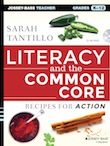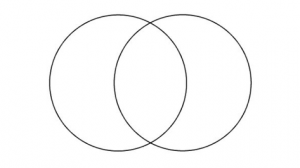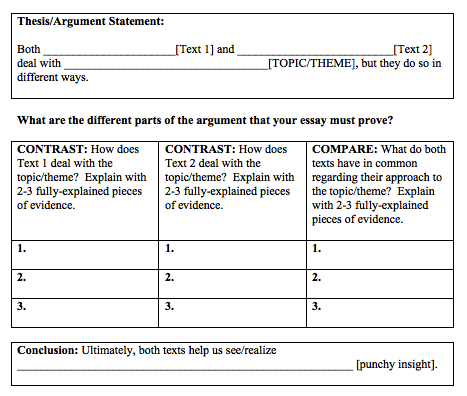PARCC Prep: A Better Way to Teach Compare & Contrast

This post about preparing for Common Core assessments offers new material developed by Sarah Tantillo, the author of Literacy and the Common Core: Recipes for Action (Jossey-Bass, 2014) and The Literacy Cookbook (Jossey-Bass, 2012). Be sure to browse her links to other PARCC Prep articles at the end of this post. And check out her website, The Literacy Cookbook, and her TLC Blog.

In the PARCC literary analysis task, students must closely analyze two literary texts—often focusing on their themes or points of view—and compare and contrast these texts.
In previous posts, I’ve proposed a lesson series to tackle this task and a tool for teaching students how to infer theme, which is a common requirement since Common Core Reading Anchor Standard #2 is “Determine central ideas or themes of a text and analyze their development; summarize the key supporting details and ideas.”
This post deals with the challenge of how to organize a compare-and-contrast essay. Many students struggle with this task, I believe, for two reasons:
(1) Teachers often rely on Venn diagrams to teach the concept of “compare and contrast,” and Venn diagrams are not a useful way to organize writing. They were meant for discussions around set theory, not for essay writing. Seriously. Could you write an essay from notes inserted into this?
(2) Teachers tend to assume that students can transfer their “understandings” from Venn diagrams into full-blown essays, so they don’t spend enough time explaining how to outline and develop the evidence and explanation needed.
Use charts, not Venns
As I’ve noted previously (here and here), instead of trying to fill in Venn diagrams, students should annotate texts with charts that have either two or three columns, depending on the number of texts. For literary analysis, it’s two; for research writing, it’s two texts and a video. Students then put checkmarks next to items that the texts have in common. What remains unchecked should be dealt with in the “contrast” paragraphs.
But you can’t easily write an essay from those notes. You have to organize your ideas.
Here is a simple graphic organizer to help students turn those notes into an outline for writing (click on the image to download a student-friendly PDF version).
As always, students will need lots of modeling and practice to master this step.
Editor’s note: Sarah Tantillo has agreed to share her other PARCC Prep materials with our readers. Just click to access these various posts at her blog. Visit her TLC “PARCC Prep” page to stay up to date with her Common Core assessment materials.
PARCC Prep READING RESOURCES:
General Information:
- PARCC Prep: How and Why to Analyze Reading Questions
- PARCC Prep: How to Unpack Reading Assessment Results
- COMMON CORE READING: A Solid Resource for Texts and Materials!
- COMMON CORE READING: Another Great Resource for Nonfiction Texts!
PARCC Prep WRITING RESOURCES:
General Information:
- How to Prepare Students for PARCC Writing Tasks
- PARCC Prep: How to Unpack Literary Analysis and Research Writing Prompts
- User-Friendly PARCC Writing Rubrics!
Research Writing Tasks:
- PARCC Preparation: Tackling the Research Writing Task
- PARCC Prep: How to Unpack Literary Analysis and Research Writing Prompts
- User-Friendly PARCC Writing Rubrics!
Narrative Writing Tasks:
Literary Analysis Writing Tasks:
- PARCC Prep: Literary Analysis Writing Task
- Literary Analysis Writing: How to Infer Themes from a Text (CCS#2)
- PARCC Prep: How to Unpack Literary Analysis and Research Writing Prompts
- User-Friendly PARCC Writing Rubrics!







































Are there any examples of a final compare and contrast essay available?